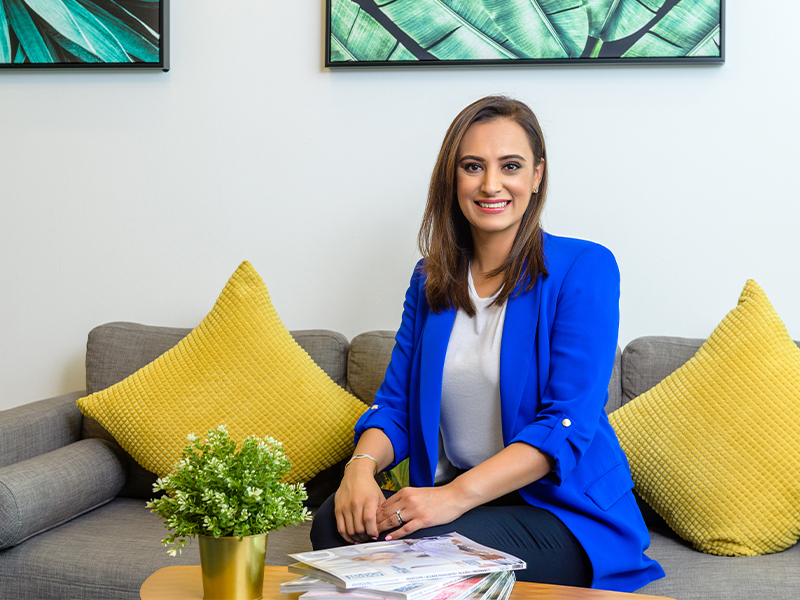Dealing with trauma and the symptoms of trauma can have a huge impact on your life. But it doesn’t have to lead to lifelong difficulties. DR SANVEEN KANG is Founder and Principal Clinical Psychologist at Psych Connect. She talks us through an innovative new trauma informed care programme they’ve developed to help people work through their trauma for a better tomorrow.
What is a traumatic experience, and what are the symptoms of trauma?
A traumatic experience happens where one’s internal and external resources become inadequate in dealing with a threat or a series of threats. In essence, it shatters the individual’s sense of control, connection and meaning in life. A person dealing with trauma has a heightened sense of mortality and vulnerability. It evokes an overwhelming experience which inspires helplessness and terror due to a fight/flight/freeze/collapse response.

Why did you develop the Connected Self trauma programme?
Connected Self is a specialised practice and therapy framework entailing the assessment and treatment of children, individuals and families who have experienced and survived trauma and loss.
The programme was conceptualised in collaboration with our therapy lead Mr Parandaman after reflecting on two main ideas: how trauma is conceptualised, and how it’s treated. For a long time, the understanding of trauma by sufferers and clinicians alike was focused on and limited to PTSD. We expanded our knowledge through more current research on different types of traumas, such as adverse childhood experiences (ACEs) or the impact of sensory processing and interpersonal stress for neurodivergent individuals. This allowed us to be more attuned and sensitive to our clients’ needs.
This was coupled with my increasing fascination with the mind-body connection. Traditional psychotherapies focus mostly on language and the thinking brain. Yet, life is experienced somatically. Our bodies remember what was felt, smelt, seen, heard and tasted. And these memories aren’t stored in just one part of the brain. Trauma complicates how memory is stored. It can shut down, recall and fragment sequences of events and prevent information from different parts of the brain from combining to make a memory using words. Parts of the brain implicated in language production shut down when confronted with a high level of stress. This explains why some people dealing with trauma struggle to articulate verbal responses when asked to relate stressful experiences.
My team and I found it hard to reconcile that in therapy. We relied and focused only on what people were thinking, ignoring many other aspects of the lived human experience. Our clinicians help clients make sense of their embodied experience and generate new meaning – one that enables them to grow and frees them from the narrative that has kept them stuck.

Who is the programme designed to help?
We offer trauma assessments and interventions for children (from three years old), adolescents, adults and families. We consult on cases that concern but are not limited to ACEs, Developmental Trauma, Acute Stress, Post Traumatic Stress Disorder (PTSD) and Complex PTSD (CPTSD). And we also treat Sexual and/or Spousal abuse and victims of bullying behaviours and traumatic bereavement.
Tell us about your approach. Is it one-on-one or are parents involved in the treatment too?
Connected Self is a holistic and evidence-based approach. It’s developed to be individualised, and starts with a trauma-informed assessment with the child and family. Intervention often is a combination of one-to-one, parenting and family sessions. We are committed to having a whole family approach. The treatment does not stop within Psych Connect but it can extend to school and if needed other extended circles to ensure that children experience safety and compassion.
What sort of activities and exercises do you use to engage with young people touched by trauma?
People often fail to consider how our past shapes the present and future. These experiences hide inside our body. While most forms of traditional psychotherapy use the thinking brain, it can end up causing more assault to the child’s sense of self. We focus on calming the primitive brain and engaging the client through an embodied approach. We incorporate creativity, symbolism, music, movement and rhythm as it is crucial in the development of young people – they use it for a myriad of reasons including emotional regulation, making meaning, problem solving, conflict resolution, adaptive skills and social participation. These activities act as a bridge between the child’s inner world and their emotional need.
What sets your programme apart from other treatments available?
The Connected Self trauma programme and conceptualisation of trauma is only offered in Psych Connect. It’s an integrated and comprehensive system aiming to provide high quality and professional care and is focused on reducing the burden of trauma on individuals and family. We employ gold-standard treatment, and the personnel in our clinic are trauma-sensitive and informed.
Tell us more about trauma informed care.
By taking a trauma informed care approach, all clinicians within Psych Connect speak the same language. Screens are done as part of a self-report from the initial interaction. We have a narrative that explains why certain self-report questions are asked, ensuring safety. Cultural beliefs and practice systems are also taken into context to ensure sensitivity is observed.
Tell us about your team of professionals. Will a patient see a few different types of specialists as part of the programme?
The Connected Self team comprises a highly skilled team of psychologists, psychotherapists, art psychotherapists, occupational and speech therapists. Our team has direct work experience working with trauma and the symptoms of trauma.
The team specialises in providing evidence-based interventions such as, but not limited to, Dynamic Maturational Model, dyadic (parent-child) approaches, mentalisation from a parenting perspective, child and adult specialisation in eye movement desensitisation and reprocessing (EMDR) and creative therapies. We also offer sensory-based trauma intervention, yoga-based trauma group psychotherapy, trauma-focused cognitive behavioural therapy (TF-CBT) and sensory motor arousal regulation.
It depends on the complex needs of the client. Only where necessary and dependent on the sequence of the treatment, a client may consult several specialists.
How have you seen trauma informed care improve the lives of people dealing with trauma?
We have seen people become more functional, responsive and aware, and exhibiting lesser symptoms of trauma. This improves the way they rest, relate, engage and create.
Psych Connect is at 10 Winstedt Road, #03-13.
6493 0244 | psychconnect.sg
Now you know where to go if you’re dealing with trauma, you might be interested in finding out more about how stress affects children.
This article first appeared in the August 2023 edition of Expat Living. You can purchase the latest issue or subscribe, so you never miss a copy!
To make the most of living in Singapore, read our latest City Guide here for free!
Don't miss out on the latest events, news and
competitions by signing up to our newsletter!
By signing up, you'll receive our weekly newsletter and offers which you can update or unsubscribe to anytime.



